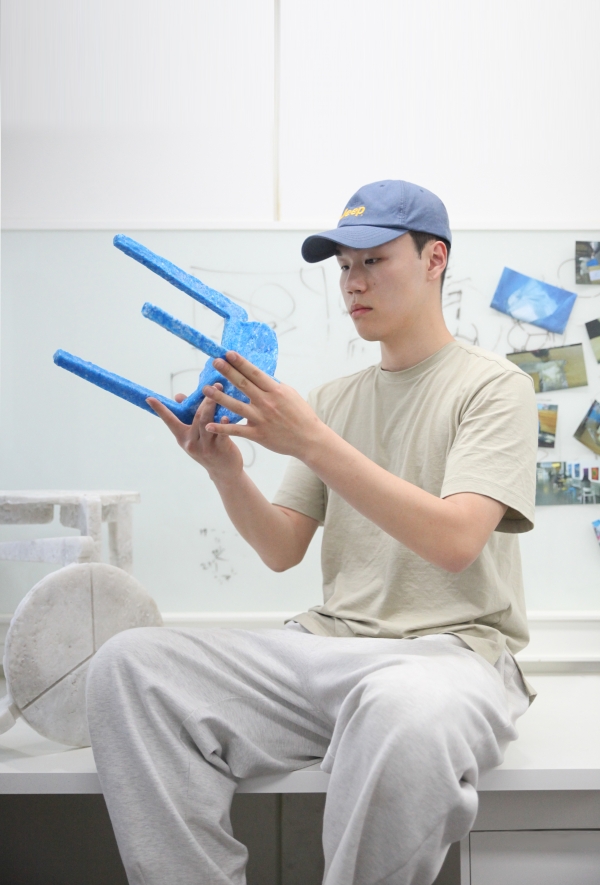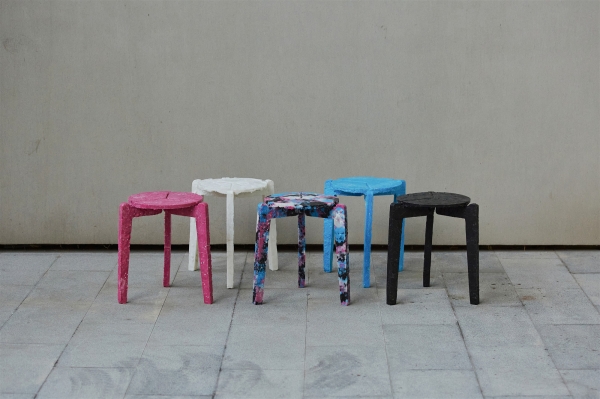
The increased usage of face masks amidst the COVID-19 pandemic is causing sizable environmental problems across the globe. The majority of face masks made from polypropylene – a type of plastic – are rarely included in recycling discussions. However, there are people determined to make a difference despite the odds. Kim Haneul, a 23-year-old student who graduated from the Department of Living Design at Kaywon University of Art & Design, transformed used face masks into stools.
“Recycling plastic has become a hot topic since a few years ago, but why are we not recycling face masks when they also contain plastic materials?” Kim said. “I was certain that there would be a way to recycle face masks as well and as a person who builds furniture, I thought ‘Why not make a stool out of it?’”
Kim called his work Stack and Stack based on the idea of stacking up discarded face masks, melting and stacking them up again, which consequently results in the finished stools to be stacked.
It takes around 1,500 used face masks to build a Stack and Stack stool. Kim was able to collect such large amounts of materials from a used face mask collection box on campus. While his work gained attention, some began to point out the possible biological dangers in collecting used face masks. Realizing this, Kim still employs used face masks but now puts them through a sterilization process using a heat gun that blows air at over 300 degrees Celsius to ensure they are free of coronavirus. Kim began to use defective face masks thrown away from factories – another blind spot in the waste cycle.
A surprising fact was that used face masks work better than new ones during their transformation into chairs. As face masks consist of thin layers of plastic threads, the loose and worn-out threads of the used face masks seem to be better processed than the new and stiff threads of the new face masks.

“Spreading my message to recycle plastic to a wider audience is my goal,” Kim said. “Enabling massive production of face mask stools is the best way to reach more people directly. So I am planning to spend the rest of this year trying to make that happen.”
While building on the upcycling and recycling movement, Kim acknowledges the difficult environmental challenges ahead and the limits to what individuals like himself can do to solve them.
“This is a sort of problem that influential companies and the government should intervene in,” Kim emphasized. “The efforts of individuals do not guarantee big changes. But even so, individuals should still perform basic practices such as using less plastic, recycling, and increasing awareness of the situation to help the environment.”
Currently, Kim continues to collaborate with various companies and brands. He believes the public awareness regarding environmental pollution is improving and gaining much public response. Furthermore, Kim feels that attention from groups and organizations is increasing significantly. The fact that environmental pollution is a problem that everybody has to solve is being taken into consideration.
“University students are the most influential generation,” Kim highlighted. “As the most ambitious generation, they have the power to fearlessly speak up to the world. All those courageous attempts are what drives and changes our society. In the future, I hope more innovative and creative ideas are formed.”
Rather than to have a single goal in his life, Kim hopes to be a person who can stay active. By putting out influential works and messages into the world, he wishes to be remembered for a long time.

